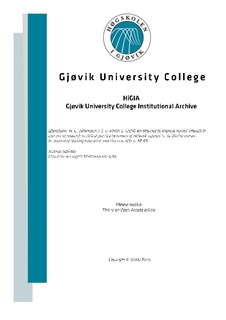| dc.contributor.author | Björkström, Monica E. | |
| dc.contributor.author | Johansson, Inger Signe | |
| dc.contributor.author | Athlin, Elsy | |
| dc.date.accessioned | 2015-02-13T13:59:43Z | |
| dc.date.available | 2015-02-13T13:59:43Z | |
| dc.date.issued | 2014 | |
| dc.identifier.citation | Björkström, M. E., Johansson, I. S. & Athlin, E. (2014) An attempt to improve nurses’ interest in and use of research in clinical practice by means of network support to ‘facilitator nurses’. In: Journal of Nursing Education and Practice, 4(3), p. 58-68. | nb_NO |
| dc.identifier.issn | 1925-4040 | |
| dc.identifier.uri | http://hdl.handle.net/11250/276279 | |
| dc.description | This article is designed as ”Open Access”. This is the journal's PDF originally published in Journal of Nursing Education and Practice, http://dx.doi.org/10.5430/jnep.v4n3p58 | nb_NO |
| dc.description.abstract | Background: Scientific knowledge is expected to be used in clinical practice to ensure that patients are given
evidence-based nursing care. Therefore, in order to improve nurses’ research utilisation in clinical practice a network had
been provided for nurses especially interested in nursing development in eleven wards. These nurses were expected to take
on the role of key person (facilitator) for nursing development in clinical practice.
Aim: The study was aimed at describing nurses’ interest in nursing research, how network support to ‘facilitator nurses’
could improve development in patient care based on evidence, and what hindering factors for such development could be.
Methods: One and a half years after onset of the project a follow-up study was conducted with a questionnaire answered
by 75 (64%) nurses, and group interviews with nine facilitators and eleven head nurses.
Findings: The nurses’ interest in research utilisation was in general high and in eight wards development work had started.
The facilitator nurses had mostly worked without involving their colleagues. Hindering factors for nursing development
were related to time, EBP knowledge, involvement and the interest of head nurses and colleagues. Education, work place,
previous participation in research projects, and participation in the network impacted positively on nurses’ attitudes to and
interest in research.
Conclusion and implication for clinical practice: Providing networks to ‘facilitator nurses’ in the ward could be useful
for developing nursing care based on research findings. However, support from nurse leaders, involvement of the whole
nursing staff, and training in research utilisation are important factors for success. | nb_NO |
| dc.language.iso | eng | nb_NO |
| dc.publisher | Sciedu Press | nb_NO |
| dc.rights | Navngivelse 3.0 Norge | * |
| dc.rights.uri | http://creativecommons.org/licenses/by/3.0/no/ | * |
| dc.subject | clinical nursing | nb_NO |
| dc.subject | evidence-based practice | nb_NO |
| dc.subject | network support | nb_NO |
| dc.title | An attempt to improve nurses’ interest in and use of research in clinical practice by means of network support to ‘facilitator nurses’ | nb_NO |
| dc.type | Peer reviewed | nb_NO |
| dc.type | Journal article | nb_NO |
| dc.subject.nsi | VDP::Medical disciplines: 700::Health sciences: 800::Nursing science: 808 | nb_NO |
| dc.source.pagenumber | 58-68 | nb_NO |
| dc.source.volume | 4 | nb_NO |
| dc.source.journal | Journal of Nursing Education and Practice | nb_NO |
| dc.source.issue | 3 | nb_NO |

